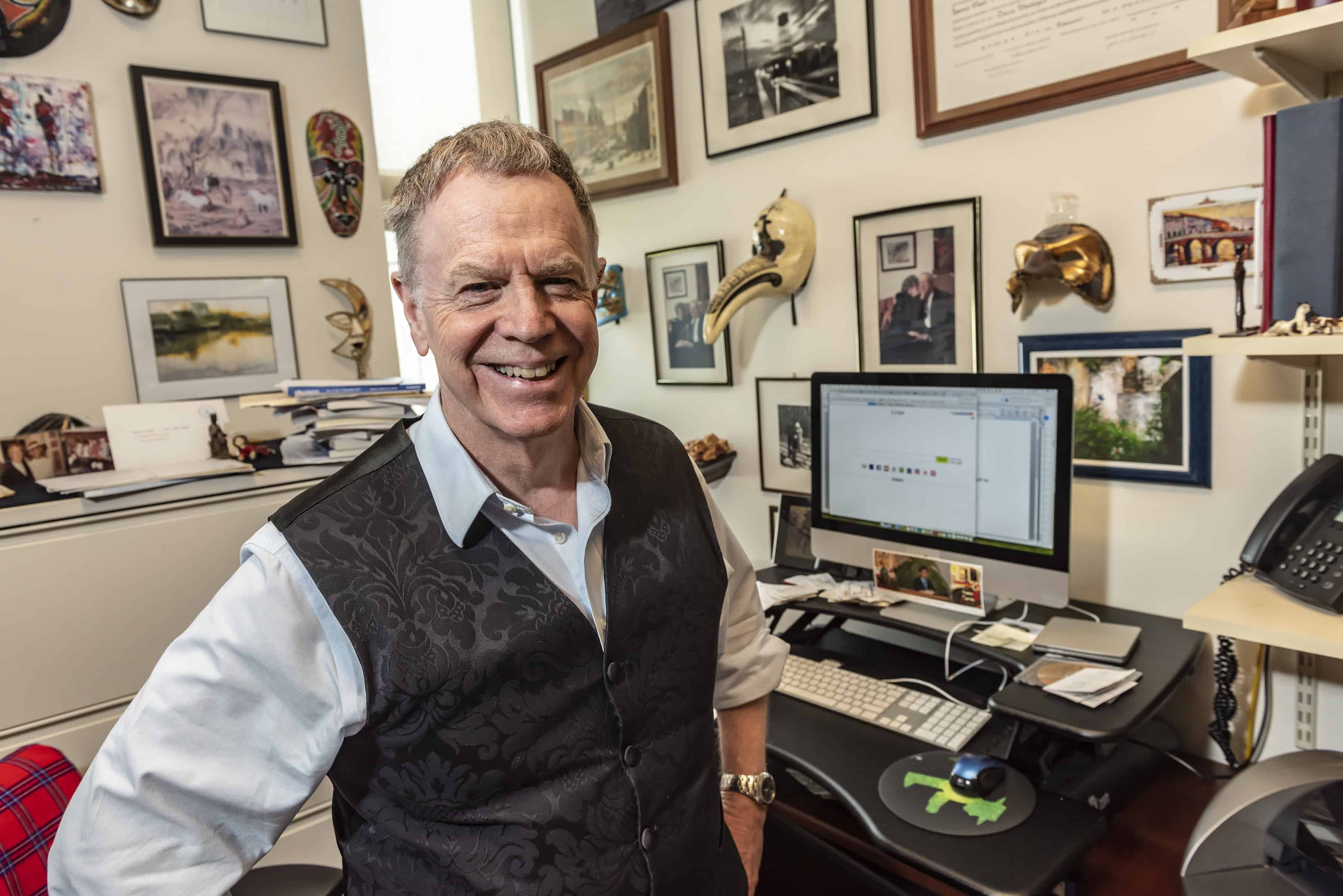James Keenan, S.J. is the Canisius Professor of Theology at Boston College. He was interviewed by author Malcolm Gladwell as part of a three-episode series on the podcast “Revisionist History.” TJP spoke with Fr. Keenan about his experience of being part of the podcast while also going deeper into some of the themes that are addressed in it.
*****
Tell us how this all came together. How did you get connected with Malcolm Gladwell for his podcast “Revisionist History”?
Keenan: At the end of February, Malcolm Gladwell wrote me that he was interested in the revival of casuistry, a method of moral reasoning. He had read about it and spoken with philosophers on the topic, becoming acquainted with the British philosopher Stephen Toulmin, among others.
Gladwell decided he wanted to look at it through the lens of Jesuit casuistry and asked around. Everyone suggested me, since I have written quite a bit on the topic.
This past semester, I was teaching at the Gregorian University in Rome, so when I told him that, he mentioned he would be in Milan in mid-March. He came down to meet me at my residence, the Collegio Bellarmino, where some 65 Jesuit priests are living who are studying for licenses or doctorates at the Gregorian University, the Alphonsian Academy, or the University of Sant’Anselmo.
*****
Had you read or listened to anything from Malcolm Gladwell before?
Keenan: I had never heard of him before. I mentioned his name to a colleague, and he said that Gladwell had a great following, so I checked out “Revisionist History.” But, fearing I’d become biased one way or the other, I forwent listening to earlier episodes. I have since listened appreciatively to a variety of episodes.
*****
How was the experience of giving the interview? What were your impressions of Gladwell?
Keenan: Before we met, I sent Gladwell an unpublished article of mine called “Jesuit Casuistry.” On the day of the interview, he arrived right on time, set up his simple recording device and started interviewing. We must have talked for nearly two hours.
He certainly read the article I sent, but it seemed to me that he had read a lot of my other material on moral reasoning as well as others. In a word, he was well-versed and well-prepared on the topic, and we covered a lot of ground.
*****
As you mentioned, Gladwell talks at great length in the podcast about the method of moral reasoning called casuistry. Could you give us a brief summary of what this is all about?
Keenan: In the later 16th century, in a world of great expansionism, principles did not apply as simply to new moral questions that were arising. Ethicists began adopting a “case-based” logic of descending into the details of a moral issue while comparing the case in question with a paradigm case. This is what we call casuistry.
A case that I often use, which Gladwell took from our conversation, is when a group of merchants in Holland wanted to know if maritime insurance was really wrong, ethically speaking. Three centuries earlier, the pope had condemned it as usury. The leading nominalist professor at Paris, John Mair, wrote an answer comparing a maritime insurance agent’s work to being like the work of a ship captain. The captain works to get cargo from point A to point B; the insurance agent works to guarantee that the worth of the cargo gets from point A to point B. In a very extensive set of analogies, Mair convinced readers that the insurance agent’s work was like the captain’s case, that is to say, morally legitimate. With all the trade with Asia to say nothing of the pillaging of the Americas and Africa, Europe could not get through the 16th century without reconsidering the teaching on maritime insurance.
Thousands of other issues were resolved through this casuistry: this “case-based” logic of descending into details while comparing the questionable case with a paradigm case (or a “standard case” as Malcolm refers to it). What was needed for the maritime insurance case was a paradigm case to compare it to that was clearly right: the work of the captain of a ship.
In the first episode of the series, Gladwell compares pitcher Andy Pettitte, who used human growth hormone to recover from injury, to the standard case of Tommy John, who had a new surgery performed on him, and to the standard case of Barry Bonds, who took performance-enhancing drugs and improved his play significantly. Gladwell poses the questions: which standard case was closer to the case of Andy Pettitte? This is what it looks like to use casuistry in moral reasoning.
*****
Gladwell quotes you in the series with the phrase “descending into the particular.” Where did you get that phrase from?
Keenan: It’s funny you should focus on “descending into the particular.” The day the first episode ran, a friend wrote me, “I heard ‘descending into the particulars,’ and thought how wonderfully it sounded like Jim Keenan.”
After Gladwell ran that episode I sent him another article of mine that I had published 2 years ago in Theological Studies called, “Prophetic Pragmatism and Descending into Matters of Detail.” The phrase “descending into matters of detail” is right out of Thomas Aquinas, Summa Theologiae, I-II 94.4 where he explains reasoning and the natural law and insists that the more we descend into detail, the more we realize that principles and deductive reasoning don’t easily function. We need a lot more than that, presumably, meaning the virtue of prudence. As a short hand for Thomas’ phrase I use “descending into the particular.”
*****
Is casuistry a uniquely Jesuit way to approach moral issues?
Keenan: Not exactly. Every Catholic ethicist did casuistry in the 16th century. Dominicans, Redemptorists and Jesuits were, generally speaking, distinguished by three different philosophies regarding how much freedom there was in interpreting the law casuistically. In time, casuistry got a bad name and the Jesuits were considered the ones with the lenient (humane?) interpretation.
French philosopher Blaise Pascal’s talented but intolerant (and even malicious) ridicule of the Jesuits in his “Provincial Letters” from the 1560s melded the words “casuistry” and “Jesuit” together. But any historian looking at the 16th century would recognize all ethicists as casuists, and as scholars like Julia Fleming at Creighton University and others have proven, their work was not indulgent but fairly painstakingly balanced in their descent into the particulars.
If you want to know more of the details on this history, read my book coming out next year, A Brief History of Catholic Ethics.
*****
What do you think about Gladwell’s application of casuistry in the podcast?
Keenan: I thought it was great. I thought the first episode was a classic introduction: he gave the method, and he made sure that the narratives of each of the three cases of Andy Pettitte, Tommy John, and Barry Bonds were able to be distilled.
In Rome, we had talked about the German theologian Josef Fuchs, S.J. (my own mentor) and about John Rock, the American scientist who helped develop the first birth control pill. Rock was working with casuistry: his work on birth control was to cooperate with “nature.” I thought Gladwell gave Rock’s case brilliantly in the second episode. And I must say, I had never heard Rock’s voice, so I enjoyed the episode even more since it includes audio of him speaking.
I thought the third episode about the complicated case of a man who was shot and killed by police officers was beautifully and compassionately conveyed. As the son of a New York City detective, I was especially moved by the investigative desire to understand what had happened, hoping that the discovery could bring consolation to all the parties.
*****
Are there any cases that you wish Gladwell had included in the podcast?
Keenan: I thought he might get into classic contemporary cases like genetic engineering or other future-oriented dilemmas. But in hindsight, I’m glad he stayed with the familiar. He made casuistry all the more attractive and accessible. Also, it’s indispensable to casuistry that the case is a good narrative. Gladwell scores an A+ on that.
*****
Are there any conclusions reached by Gladwell that you would contend?
Gladwell did some interesting work. Friends of mine didn’t agree with Gladwell on Andy Pettitte. They thought Pettitte was more like Barry Bonds than Tommy John. But when I asked them to explain how that was, they did casuistry!
So, in the end, they learned the method. I think that was precisely why Gladwell used that case; not to convince people about Andy Pettitte, but to argue the case casuistically, a Gladwell move indubitably.


